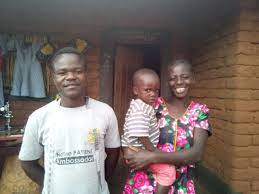Husbands support brings hope to fistula survivors in Mozambique

At a crowded waiting area outside the operation room at the Nampula Central Hospital in Northern Mozambique, women and girls waiting in line to be treated for obstetric fistula are accompanied by their husbands, brothers and fathers.
The scene of hopeful and concerned faces of the men accompanying their partners is a distinctive feature of the fistula treatment campaign led by the Mozambican Ministry of Health, with support from UNFPA, the United Nations Population Fund.
Although Mozambique has seen a decrease of almost two-thirds in maternal deaths since 1990, the absolute number of women dying during pregnancy and delivery is still one of the highest worldwide. More than 8 per cent of women of reproductive age have died from maternal-related causes in 2013.
Most of the women who survive prolonged labour and develop an obstetric fistula in Mozambique remain untreated, including 2,000 new cases reported annually. In 2013, 377 women received surgical treatment through the Campaign to End Fistula, supported by UNFPA and partners, as well as other organizations and institutions.
Care over abandonment
In many tales of obstetric fistula worldwide, men’s involvement only contributes to more suffering. Women and girls often face discrimination and isolation by their families and communities. Some are even abandoned by their loved ones due to the taboos and shame attached to this condition, the result of a prolonged and obstructed labour without prompt emergency medical intervention, such as Caesarean section.
However, there are hopeful signs in Nampula Province that men, families and communities are increasingly supporting women living with fistula: more and more men accompany their wives, girlfriends, sisters and daughters on the journey to the hospital. Abilio Inacio Penteria (36), a
Professor has been a source of care for Dolinda (25) since the day back in 2009 when she gave birth at home with the assistance of a traditional birth attendant.
“After grieving over our stillborn child, we went immediately to the nearest health facility. We knew this childbirth complication had a cure. As I always had, I stood by Dolinda’s side until the end of her fistula nightmare,” says Abilio
“Because of the support of my husband, I continued to live with the hope of a cure,” says Dolinda, with a smile.
In spite of Dolinda’s fistula condition, she and her husband went on with their lives while waiting for an opportunity to put an end to her fistula nightmare. In 2011, she delivered a healthy daughter, followed by twins early this year. All three babies were delivered at the hospital.
Dreams beyond obstetric fistula
The couple, each with one of their young twins in their arms, expresses excitement about returning home from the hospital. Dolinda, who interrupted her education in second year of high school, dreams of walking in her husband’s footsteps and becoming a professor. Abilio is aware of the role he can play in influencing fellow Mozambican men. “Men have a responsibility to make sure that women who suffer from obstetric fistula are taken to a health facility immediately to ensure its treatment,” he says.
- Helene Christensen